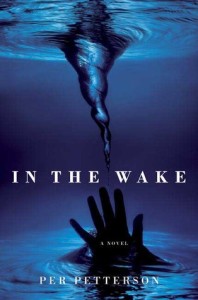It’s curious how the somewhat random choice of what to read next can bring two books into conversation with each other. This 2000 novel by Petterson, author of the marvelous Out Stealing Horses, has been lurking in my to-be-read pile for a while. I pulled it out primarily because of its stunning blue cover and the comfort of knowing I could count on this author for a thoughtful read.
Imagine my surprise on discovering that it begins with the same situation as the last novel I reviewed: with the protagonist struggling to come to terms with a traumatic disaster. Yet the two books could not be more different.
It has been six years since the ferry accident that took the lives of 43-year-old Arvid’s parents and younger brothers. He is still consumed by grief, unpacking memories of his father and mother, wrestling with both the past and the terrible present, questioning everything. He starts a new file on his computer and thinks “I am writing myself into a possible future.”
Since the accident, his marriage has fallen apart and his work as a writer has dried up, his novel-in-progress abandoned. He drinks too much—we first meet him surfacing from a blackout—and has almost no human contact. There’s his Kurdish neighbor from upstairs who has one word of English: “thanks”. And a woman in the opposite apartment block whom he sometimes sees in her window.
He’s had little to do with his remaining brother, three years older and a successful architect who lives with his wife in a gorgeous home he designed himself. That is, until his brother calls him at two in the morning, drunk or getting there, to say that he too is getting divorced, a conversation that quickly devolves into sibling sparring.
Here we are deep in Arvid’s consciousness, carried by his voice—so calm and forthright, so candid, so obviously containing oceans of emotion. The contrast is irresistible. You might think this novel is more narration than dramatic scenes, but the narration is so vivid and in the moment—present or past—that it creates scenes we experience with Arvid. They accumulate, relentless as the waves, pulling us in.
Petterson also uses very specific descriptions to ground all this ruminating. Here’s a wonderful example; Arvid has shown up at his twelve-year-old daughter’s school and, instead of getting on the bus, she’s gone with him to a cafe.
After a little while the man comes back with our order on a big tray he carries high above his head as if the place was crammed with people, but we are still the only ones there, and he lowers the tray in a sweeping circle and with a flourish sets white cups and plates of waffles on the table and a bowl with a silver spoon and jam. He pours the cocoa from a big white jug and when the cups are full he puts the jug down on the white cloth. He does not spill a drop. We just sit quietly watching. Everything is so white and sumptuous that half would be sufficient, and the waffles are lightly toasted and make the jam glow in the light from the window . . .
“Kidnappings not half bad when you get waffles,” says my daughter . . .
There are a number of cool things about this excerpt: the humor, the sentence variety, the specificity. One of the brilliant aspects of it is the way Petterson bypasses the emotions one would expect from these two—the guilt, the resentment, the sadness—and goes for the unexpected: a luxurious, sensual joy. As Donald Maass (literary agent, writer, and writing teacher extraordinaire) points out: we readers can fill in the commonplace emotions while the surprise grabs us.
This is an intense book, made bearable by moments such as this and by the steadfast voice, recounting ordinary events, dreams, memories, moments of violence and betrayal, joy and communion all with the same calm and with no self-pity. It feels genuine, more so than usual. No wonder, perhaps, since Petterson himself lost family members in the 1990 Scandinavian Star disaster, like Arvid. His description of the video Arvid watches to identify bodies in the ferry is particularly chilling.
Yet the story does not seem self-indulgent. It is a deep dive into the question of how we find or create meaning in our life, how we bear tragedy, how we begin to find the faint threads of connection.
Have you read one of Per Petterson’s books? What did you think of it?

